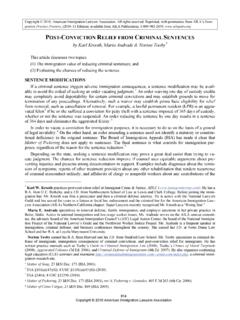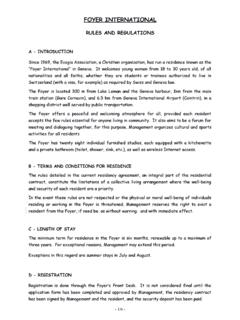Transcription of Advanced Issues In T and U Visas - Immigrant Crime
1 1 Advanced Issues In T and U Visas by Salima Khakoo, Karl Krooth, and Gail Pendleton Salima Khakoo is the CEO and managing attorney at American Dream Law LLC. Her practice includes employment, family, removal ad visa options for victims of crimes. She works as a contract attorney with non-profits including Civil Society and access Justice to provide free/low cost immigration services. Karl Krooth conducts post-conviction relief before California and Federal Courts as well as represents foreign nationals with criminal records on U Visas and other affirmative applications before USCIS. He works for a professional law corporation by the name of Immigrant Crime and Justice. He has gained practical experience in every phase of the criminal justice system by prosecuting Crime and then conducting criminal defense.
2 Gail Pendleton is co-d irector of ASISTA Immigration Assistance, which specializes in immigration relief for survivors of domestic violence, sexual assault and other crimes. She received AILA's Human Rights Award in 2001. ** This advisory covers a number of Advanced topics related to U and T Visas in a brief space. It does not provide basic information on either Crime -victim visa but reviews, for both U and T Visas : strategies for working with law enforcement to gain certifications; derivative Issues ; consular processing and travel problems; and challenges at adjustment. Working with Law Enforcement The U visa requires certification by law enforcement, INA 214(p)(1), 8 CFR (c)(2)(i). The T visa prefers, but does not require it, INA 214(o)(6), 8 CFR (f).
3 Developing effective strategies for working with law enforcement is, therefore, crucial to success in representing victims of crimes seeking these forms of status. Practice Pointers for Both Law enforcement personnel are not generally familiar with immigration attorneys and may not trust them. A fundamental principal of working with them (or any new ally) is to find a trusted messenger who can help you build a relationship with them and to encourage them to use the tools Congress created for them to work effectively with noncitizen victims of crimes: the U and T Visas . Here are some practice pointers: Work with victim advocates, either embedded in the criminal system or at service provider organizations, such as domestic violence shelters or rape crisis centers.
4 Explore other possible allies who may have influence and relationships of trust with law enforcement, such as faith-based and community-based organizations or local or state government officials. Do not wait for a crisis (real case) to reach out and meet with them; use hypotheticals to explore where they are likely to be sympathetic and where they may need more education. Check with those in your area already working with Immigrant U and T applicants; they probably already have done the things above! 2 For T Visas One advantage of working with federal law enforcement is they can help victims get continued presence quickly, which provides immediate access to all social services (the equivalent of refugee benefits), 28 CFR (b). This is not a secure immigration status, however, so even trafficking victims who can get it should seek T Visas , either with law enforcement support or without.
5 INA 214(o)(7), 8 CFR (h)(2). Remember that local law enforcement can also certify T Visas , even though the form is still designed only for federal authorities. 8 CFR (a). If you cannot get a law enforcement certification, show how you tried to get certification by keeping and sharing with United States Citizenship and Immigration Services (USCIS) phone, mail and email records of contact with ICE or other federal agencies. 8 CFR (h)(2). For U Visas The Department of Homeland Security (DHS) has issued a very helpful guide for law enforcement on their role in certifying U Visas . U Visa Law Enforcement Certification Guide for Federal State, Local, Tribal and Territorial Law Enforcement (Dec. 2011) (hereinafter Guide ), available at Use this guide as a tool; it meets the criteria noted above, coming from a trusted source.
6 Its Frequently Asked Question section may be particularly helpful, answering questions about whether law enforcement can certify old cases (yes), whether they are granting status by doing so (no), whether the Crime they charge must be the same as the Crime they certify (no); and whether they should be concerned about the applicant s substantial harm or criminal and immigration history (no). Guide at 8 - 15. USCIS also has set up several other routes for law enforcement to contact them with questions, including webex presentations just for law enforcement and a direct telephone and email line to USCIS VAWA/U/T unit at the Vermont Service Center. Guide at 17. U Helpfulness Practice Pointersi Work with your client and a victim advocate to explain why law enforcement wants the helpfulness it is requesting; in turn, the victim advocate may be able to convince law enforcement that the helpfulness they are seeking is too dangerous for your client.
7 Start with the law enforcement agencies that are likely to have the broadest definition of helpfulness, , police need people to talk to them; district attorneys need credible testimony. Do not assume the information your client has is not enough; law enforcement may have an open file on the perpetrator, especially for crimes such as sexual assault where perpetrators generally prey over time on a vulnerable population, , undocumented women. If the facts do not obviously fit in one of the U categories of crimes, present the facts to allies in the criminal system and ask them whether there are crimes they investigate that fit one of the categories. 3 Derivatives The same general classes of family members qualify as derivatives for both U and T Visas : If the principal is under 21, he or she may include spouse, children, parents, and siblings under 18 at time of principal filing; if the principal is over 21, he or she may include the spouse and children.
8 INA 101(a)(15)(U)(ii) & (T)(ii). Adult T principals may also include parents and siblings under 18 at date of principal filing if those family members face a present danger of retaliation for the principal s escape from trafficking or helpfulness to law enforcement. INA 101(a)(15)(T)(ii)(III). Because of statutory differences between T and U Visas at section 214, USCIS at the time of this writing is holding the cases of U derivatives who age out after filing or after Guidance addressing this problem is expected soon. Readers with affected cases should check with the AILA VAWA subcommittee or the ASISTA website ( ) for updates. For T Visas , USCIS measures age of both principal and derivative at time of principal filing. INA 214(o)(4) & (5).
9 Practice Pointers on U Derivative Age-outsiii All U derivatives whose cases are on hold should file requests for extension of status on Form I-539, noting that they are awaiting USCIS guidance on age-outs. INA 214(p)(6).iv Principal U recipients whose derivatives are stuck abroad due to the age-out problem MUST file extensions of status for Do not adjust these principals! Derivatives abroad have no status to extend, so they cannot file I-539s, and principals who adjust before their children enter the United States have rendered the children ineligible for U status. 8 CFR (g). If those children also have aged out, they are no longer eligible to adjust along with the principal, see INA 245(m)(3), and the only route to status will be a regular family-based petition filed by the now lawful permanent resident parent.
10 Consider filing Deferred Action for Childhood Arrival (DACA) applications if they are otherwise Consular Processing & Travel Processing abroad is generally the same for T and U Visas , as is the law on absences affecting adjustment (no more than 90 days or 180 days aggregate). INA 245(l)(3) & (m)(2). For both, therefore, it's important to warn your clients before they travel of the consequences for adjustment of stays abroad. There are some differences, however. For T Visas : Unlike U visa applicants, T visa applicants may not travel and process their Visas abroad. Visas for Victims of Human Trafficking, Approved T visa holders must obtain advance parole before travelling (Questions and Answers: Filing T, U, and VAWA Petitions with USCIS, ) 4 Those eligible for adjustment may request advance parole but must have three years of continuous physical presence.






